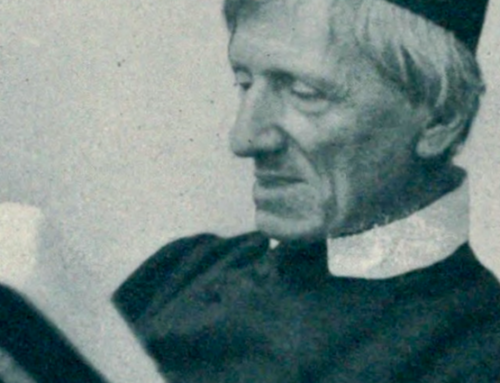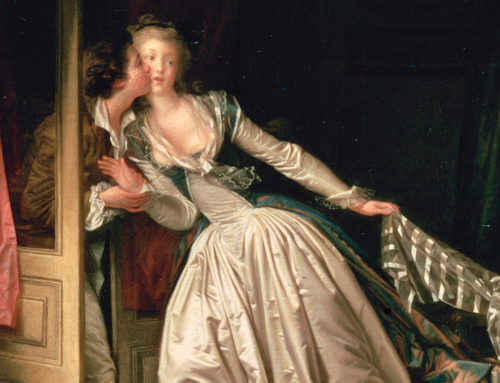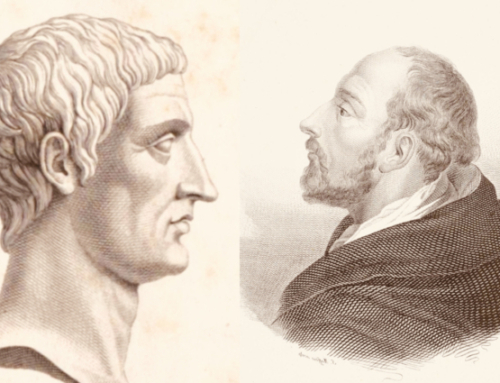As a robust Christian Platonist, Boethius saw a profound resonance between the truths of Platonic philosophy and Christian faith. The articulation of Platonic thought furnished an occasion for Boethius to tacitly meditate upon and be nourished by his own Christian faith, without having to draw explicit parallels in “The Consolation of Philosophy.”
 The Consolation of Philosophy by Boethius is an unjustly neglected masterpiece. As C.S. Lewis remarked of Plato’s Symposium, no one should be allowed to die without having read it—or at least no student ought to graduate without having encountered the magnum opus of Saint Severinus Manlius Boethius. Composed in the 5th century while Boethius was under imminent threat of execution, the Consolation is nonpareil as a work of intersectional scholarship; for in it the classical Greco-Roman world intersects with the Judeo-Christian, Athens meets Jerusalem, faith encounters reason, prose intersects poetry, and a supernal being descends from heaven to unlock the ‘mind-forged manacles’ which bind a mortal to earth, reminding him that nostra conversatio in caelis est. The depth of its philosophical inquiry is matched only by the beauty of its lyrical and liturgical alternation between prose and verse. The work’s genius is seen in the fact that although its premises are those of Christian Platonism it is greatly admired by scholars who are neither. Thus a skeptic of such colossal proportions as Edward Gibbon could write that it was “a golden volume not unworthy of the leisure of Plato or Tully, but which claims incomparable merit from the barbarism of the times and the situation of the author.”[1] Bertrand Russell, the most eminent atheist of the 20th century, echoing Gibbon, concedes that Boethius “would have been remarkable in any age; in the age in which he lived he is utterly amazing.”[2] The philosophical scope of the Consolation, quite apart from its literary merit, is simply staggering; it raises questions about the moral order of the cosmos, the ultimate purpose and meaning of human existence, freedom of the will, the mystery and nature of evil, and the relationship between chance and providence in human affairs. Entire books have been written in response to each question, but Boethius manages to successfully integrate them into his dialogue with Lady Philosophy in a way that is much more than a vignette and less than an encyclopedic treatise.
The Consolation of Philosophy by Boethius is an unjustly neglected masterpiece. As C.S. Lewis remarked of Plato’s Symposium, no one should be allowed to die without having read it—or at least no student ought to graduate without having encountered the magnum opus of Saint Severinus Manlius Boethius. Composed in the 5th century while Boethius was under imminent threat of execution, the Consolation is nonpareil as a work of intersectional scholarship; for in it the classical Greco-Roman world intersects with the Judeo-Christian, Athens meets Jerusalem, faith encounters reason, prose intersects poetry, and a supernal being descends from heaven to unlock the ‘mind-forged manacles’ which bind a mortal to earth, reminding him that nostra conversatio in caelis est. The depth of its philosophical inquiry is matched only by the beauty of its lyrical and liturgical alternation between prose and verse. The work’s genius is seen in the fact that although its premises are those of Christian Platonism it is greatly admired by scholars who are neither. Thus a skeptic of such colossal proportions as Edward Gibbon could write that it was “a golden volume not unworthy of the leisure of Plato or Tully, but which claims incomparable merit from the barbarism of the times and the situation of the author.”[1] Bertrand Russell, the most eminent atheist of the 20th century, echoing Gibbon, concedes that Boethius “would have been remarkable in any age; in the age in which he lived he is utterly amazing.”[2] The philosophical scope of the Consolation, quite apart from its literary merit, is simply staggering; it raises questions about the moral order of the cosmos, the ultimate purpose and meaning of human existence, freedom of the will, the mystery and nature of evil, and the relationship between chance and providence in human affairs. Entire books have been written in response to each question, but Boethius manages to successfully integrate them into his dialogue with Lady Philosophy in a way that is much more than a vignette and less than an encyclopedic treatise.
Among the abiding questions that scholars pose about the Consolation is the worldview of Boethius himself. Although a 5th-century Catholic author under sentence of execution, at no point does Boethius make explicit reference to the Trinity, the Incarnation, or any distinctively Catholic doctrine at all. This has caused many readers of the Consolation to suppose that Boethius, although raised Christian, had abandoned the Christian faith by the time he wrote the Consolation in favor of pagan thought, in the manner of Julian the Apostate. After all, one of the chief claims of Christianity is its unique consolatory power in the face of death: Christ conquers death in the crucifixion, and Christians are exhorted to meditate on this uniquely salvific act as a means of consolation to face their own going hence. As the Paschal Troparion of the Byzantine Rite puts it: “Christ is risen from the dead, trampling down death by death, and upon those in the tombs bestowing life.” Surely a scholar such as Boethius, if he were a believing Christian, could not but devote his intellectual energies to pondering the uniquely Christian articles of faith with respect to life, death, and salvation in the final hours of his life. Since he does not, the reasoning goes, perhaps it is more sensible to see him as an intellectual giant who abandoned the claims of Jerusalem for those of Athens.
C.S. Lewis questions this train of thought in his work The Discarded Image. On the contrary, Lewis writes, “If we had asked Boethius why his book contained philosophical rather than religious consolations, I do not doubt that he would have answered, ‘But did you not read my title? I wrote philosophically, not religiously, because I had chosen the consolations of philosophy, not those of religion as my subject. You might as well ask why a book on arithmetic does not use geometrical methods.’”[3] And yet, granted that theology and philosophy are distinct disciplines, one can still wonder why exactly Boethius chose philosophy rather than theology as his subject in such a dire situation. Lewis’ distinction helps to blunt the force of the suggestion that Boethius must have been a pagan revert, but it does not exactly refute it either.
This essay seeks to further elaborate Lewis’s commentary. The mystery of why the Christian author Boethius wrote on pagan philosophy in Ostrogothic captivity, I wish to argue, disappears if we consider Boethius to have been a robust Christian Platonist. As such, Boethius saw a profound resonance between the truths of Platonic philosophy and Christian faith. This resonance, far from being a scandal or liability, somehow calling into question the uniqueness of Christian dogma, was for Boethius a ringing confirmation that recta ratio and vera fide ultimately lead to the same end and mutually reinforce one another. On this view, the articulation of Platonic thought furnished an occasion for Boethius to tacitly meditate upon and be nourished by his own Christian faith, without having to draw explicit parallels in the Consolation.
Indeed, garish as it may seem to some, one could perhaps go so far as to call the Consolation a work of apologetics. For apologia is derived from the protean Greek word logos, which among other things means ‘reason’ or ‘logic.’ The prefix apo signifies a ‘return to,’ so that the word apologia means a return to reason.[4] And from the very outset of the Consolation, Lady Philosophy is doing just that—calling poor Boethius back to reason, prodding him to awaken from the philosophical slumbers into which he has fallen: “Cum te, inquit, maestum lacrimantemque vidissem, ilico miserum exsulemque cognovit; sed quam id longinquum esset exilium, nisi tua prodidisset oratio, nesciebam.”[5] Lady Philosophy’s rebuke of Boethius’ philosophical backsliding calls to mind much of the admonitions in the New Testament about the perils of spiritual backsliding: “Therefore remember the height from which you have fallen.”[6] Both for Lady Philosophy and for the New Testament, returning to reason, returning to the logos, finally means a return to God. Throughout the Consolation, Lady Philosophy will tend to the amnesiac Boethius with the philosophical medicine of anamnesis.
While there is some cogency to the notion that Boethius was a crypto-pagan, we can see how that logic falls apart, mutatis mutandis, when applied to a more contemporary example. The most widely read piece of literature in the 20th century is J.R.R. Tolkien’s Lord of the Rings. Tolkien conceived of the work in perilous circumstances, in the trenches of World War I. Certainly his life was in imminent danger. And yet, the entire corpus of Lord of the Rings makes no direct mention of Catholicism or Christianity. Its mystique is far more redolent of Norse mythology than any kind of explicit Christian dogma. Given these facts, suppose scholars two hundred years down the road reasoned in the following manner. Since Tolkien’s magnum opus, conceived in life-threatening circumstances, makes no mention of Christianity but is replete with allusions to pagan Norse mythology, perhaps it is more sensible to view Tolkien as a crypto-pagan who was only nominally Christian to conform to the expectations of 20th-century British society. Immediately, we see that such a theory is catastrophically gratuitous with respect to Tolkien, who was not only an orthodox Catholic, but who even went as far as to describe Lord of the Rings as a fundamentally Catholic work.[7] If this hypothesis carries no water for Tolkien, perhaps it is not more perspicacious when applied to Boethius.
Of course, we have no such letter from Boethius informing us that the Consolation is a Christian work. We do know that his theological writing is very much concerned with theological orthodoxy. In light of these facts, perhaps the old, sturdy via media is the most plausible view after all: Boethius was neither a Christian ever so subtly satirizing the claims of pagan philosophy, as Joel Relihan contends in The Prisoner’s Philosophy, nor a crypto-pagan who had abandoned Christianity; he was instead a robust Christian Platonist.[8]
The late classicist A.H. Armstrong articulates this view: “Boethius, though of course in no way a naïve or unscholarly person, represents… what may be called the ‘naïve’ or ‘concordist’ kind of Christian Platonist, who finds no difficulty in assuming that Plato and the Bible are on all important points saying exactly the same thing.”[9] Such a concordist view was hardly new within the world of Christian theology. For instance, writing in the second century, Justin Martyr had said, “Socrates and Heraclitus, although they were accounted atheists, were Christians, since they lived according to the Logos.”[10] Saint Augustine, in one of his more irenic and ecumenical states of mind, expressed concordance this way in his Retractationes, not retracting but reaffirming the principle that “The same thing which is now called Christian religion existed among the ancients. They have begun to call ‘Christian’ the true religion which existed before.”[11] The idea of a divine wisdom common to both pagan Platonism and Christian revelation continued down from Patristic theology into the Renaissance Platonism of Marsilio Ficino, Giovanni Pico de Mirandola, and the Cambridge Platonism of figures like Benjamin Whichcote and John Smith. Cardinal Newman in the 19th century, describing the formative impact that Christian Platonists such as Origen and Clement of Alexandria had upon him, memorably summarized a version of Christian Platonist and more broadly pagan concordance:
Some portions of their teaching, magnificent in themselves, came like music to my inward ear… These were based on the mystical or sacramental principle, and spoke of the various Economies or Dispensations of the Eternal. I understood these passages to mean that… pagan literature, philosophy, and mythology, properly understood, were but a preparation for the Gospel. The Greek poets and sages were in a certain sense prophets; for ‘thoughts beyond their thought to those high bards were given.’ There had been a directly divine dispensation granted to the Jews; but there had been in some sense a dispensation carried on in favour of the Gentiles.[12]
Within this tradition of Christian Platonism, theologians have of course differed on the extent to which Christianity and Platonism are concordant. Perhaps the majority stress the idea that Platonism is fine as far as it goes, but where it ends is where Christian theology really begins to take off. In this view, Platonism is a kind of preambula fidei, a kind of preliminary stroll-up to the cathedral gates. For others, Platonism and Christianity are only two different stained windows, and the same celestial light illumines both. But in either case, whether one is looking at early Christian Platonism, Middle Platonism, or even 20th-century figures like C.S. Lewis and Simone Weil, the theological themes we find in such authors is remarkably similar: an emphasis on the capax dei, a hierarchical cosmos which is somehow mirrored in human beings, and reason as the ‘candlelight of God.’ Unsurprisingly, these very ideas are abundantly grappled with in the Consolation.
Part of where we can see Boethius’ Christian Platonist concordism at work is in his theodicy, which he presents at the outset of Book I. In 1.4, Boethius inquires, quoting an ancient apothegm to Lady Philosophy: “Si quidem deus… est, unde mala? bona vero unde,si non est?”[13] Boethius is surveying his present condition. He has been imprisoned and cast out of political office only because he sought to fulfill Plato’s injunction that lovers of philosophy should enter the fray of politics in order to create a more harmonious society: “Atqui tu hanc sententiam Platonis ore sanxisti beatas fore res publicas si eas vel studiosi sapientiae regerent.”[14] Boethius has followed this advice, and yet he finds his political career ruined and himself in hostile captivity. Boethius’ good intentions have come to naught, but the plot of those who have wickedly conspired against him has been satisfied: “Sed innocentiam nostrum quis exceperit eventus, vides: pro verae virtutis praemiis falsi sceleris poenas subimus.”[15] And from Boethius’ own lamentable situation he draws a more general observation:
Videre autem videor nefarias sceleratorum officinas gaudio laetitiaque fluitantes, perditissimum quemque novis delationum fraudibus imminentem, iacere bonos nostril discriminis terrore prostratos, flagitiosum quemque ad audendum quidem facinus impunitate, ad efficiendum vero praemiis incitari, insontes autem non modo securitate, verum ipsa etiam defensione privatos.
“I seem to see the wicked flowing with happiness and joy, the most wicked threatening new false accusations, good men hurled prostrate with fear at my danger, while the wicked dare crime with impunity, or are even incited to rewards for them, and no means of safety or security for the innocent, and deprived even of the means of self-defense.”[16]
Boethius will reiterate a similar lament in Book IV, Prose 1, followed by a more elaborate remonstrance from Lady Philosophy. In effect, Boethius is bemoaning the fact that the world in which he finds himself does not answer to any moral order. On the contrary, those who take pains to seek moral excellence, like Boethius, are outmaneuvered in the political order and the realm of fortune more generally by men with no such scruples about the moral life. To add insult to injury, Boethius’ attempt at moral excellence not only bears no visible fruit but becomes a handicap that the unscrupulous are all too willing to exploit—no good deed seems to go unpunished.
Contrary to what we might expect, Lady Philosophy does not express any sympathy with what to all appearances seems like an eminently reasonable and just complaint. Instead, she expresses not sympathy but appalment and dismay at the premises which must have found their way into Boethius’ mind in order for him to mount such an indictment against the moral order of things in the first place.
Again, our modern assumptions might lead us to expect that Lady Philosophy will commiserate with Boethius along the lines of Rabbi Kushner’s Why Bad Things Happen to Good People. But no, Lady Philosophy, instead of joining Boethius’ indictment against the moral governance of the world, indicts Boethius as having himself imbibed morally culpable intellectual premises, leading to a state of sullen self-pity. Boethius has succumbed to the force of his passions: “Sed quoniam plurimus tibi affectuum tumultus incubuit diversumque te dolor ira maeror distrahunt, uti nunc mentis es, nondum te validiora remedia contingent.”[17]
In frustrating our expectations and our own natural inclination to sympathize with poor Boethius, the author of the Consolation is distinguishing two radically different ways of looking at the world and human life. Lady Philosophy is holding to the Christian and Platonist conviction that the order of things is fundamentally just, governed by an omnibenevolent power. But Boethius, while giving nodding approval to such an idea, has imbibed premises incompatible with such a view: premises which, according to Lady Philosophy “non ad morbum modo, verum ad interitum quoque causae.”[18]
Boethius has in fact come to adopt the premises of Plato’s antagonists, the Sophists. Namely, that the ultimate order of things is ruled only by happenstance and fortune, that justice is a mere illusion, that human life is not immortal and is not destined to any final union with God. Lady Philosophy admonishes, “Quoniam vero, quis sit rerum finis, ignores, nequam homines atque nefarios potentes felicesque arbitraries.”[19]
These two views of life are powerfully contrasted in the Book of Wisdom and Plato’s Gorgias, both works we know Boethius drew from in composing the Consolation. The Book of Wisdom begins by laying out this chance-driven, anomic view of life, which, much like the Sophists in the Gorgias, led its exponents to the conclusion that the summum bonum of life is power, pleasure, and self-assertion:
Our life is short and full of trouble, and when a man comes to his end there is no remedy; no man was ever known to return from the grave. By mere chance we were born, and afterward we shall be as though we had never been… our reason is a mere spark kept alive by the beating of our hearts… our names will be forgotten with the passing of time, and no one will remember anything we did… Come then, let us enjoy the good things while we can… Down with the poor and honest man! Let us tread him under foot… For us let might be right! Weakness is proved to be good for nothing.[20]
This proto-Nietzschean view of life is precisely the viewpoint we find Socrates battling in his argumentation with Callicles and Polus in the Gorgias. For both Callicles and Polus argue that it is far better to inflict an evil than it is to suffer it. The only danger in inflicting evil, according to them, is the liability of being caught, in which case one becomes prey to the evil of punishment. Indeed, from the viewpoint of Callicles and Polus “evil” is itself a misnomer, since the very idea stems from arbitrary moral convention. The truly wise man, Callicles elaborates, sees through all this and defies it:
That is the reason why seeking an advantage over the many is by convention said to be wrong and shameful, and they call it injustice. But in my view nature herself makes it plain that it is right for the better to have the advantage over the worse, the more able over the less. And both among all animals and in entire states and races of mankind it is plain that this is the case—that right is recognized to be the sovereignty and advantage of the stronger over the weaker.[21]
Boethius, Lady Philosophy is afraid, has somewhat capitulated to this might-is-right view. He is not armed with the ethical, and frankly basically mystical, view of Socrates, who suggests contra Polus that it is better to suffer evil than it is to inflict it.[22] To the extent that Boethius laments the triumph of the wicked and the abject nature of the innocent, he seems to have tacitly rejected the very heart of Socratic ethics, namely that “Badness of soul is the very greatest evil to which man is exposed.”[23] And in so doing, he has forgotten, as the author of the Book of Wisdom quickly reminds us after the wicked are given a chance to present their perspective, that “blinded by their own malevolence, they did not understand God’s plan… they thought innocence had no reward. But God created man for immortality, and made him the image of his own eternal self.”[24]
Whereas the Book of Wisdom couches the idea of cosmic justice in eschatological terms, Socrates is arguing more along the lines of human nature. But both Socrates and the Book of Wisdom are making essentially the same point: the path of the wicked may appear to have the upper hand in this life, but there is an unseen law of human acts to which they are nevertheless accountable. Flouting this law will take its toll on one’s nature, as Socrates argues, and finally lead to eschatological demise, as the Book of Wisdom contends.
This line of reasoning common to the Book of Wisdom and Socrates in Plato’s Gorgias is precisely what Lady Philosophy appeals to in Book IV of the Consolation by way of answer to Boethius’ animadversions about the problem of evil. For granted that the unscrupulous have their night on the town, so to speak, such an outing entails a devastating existential hangover. The calloused and tyrannical sybarite, however much he appears to be in control within the realm of fortune, is actually in the process of divesting himself of his most valuable asset, his human nature: “Haec venena potentius detrahunt hominem sibi dira, quae penitus meant, nec nocentia corpori mentis vulnere saeviunt.”[25] Stated as tersely as possible, Lady Philosophy’s reasoning is as follows: All human beings desire happiness. But true happiness can be found only in God, who is approached through acts of goodness. By committing acts of evil, the wicked distance themselves from God and efface their own nature. This entails a concomitant loss of happiness, freedom, and power. Thus, a tyrant enthroned with resplendent diadem and exotic gourmet, lording it over all, is nothing to be exercised about. His dessert is his desert, if only the poor knave knew it.
Lady Philosophy admits that this way of looking at the world may seem strange.[26] But the proper perspective, at once moral and metaphysical, is nothing less than a citadel from which the philosophically sober can look down upon and hoot at those who run afoul of it: “At nos desuper irridemus villissima rerum quaeque rapientes secure totius furiosi tumultus eoque vallo muniti.”[27]
There is a situational parallel in this metaphor to Psalm 2. Lady Philosophy speaks of ‘immoral men’ and of tyrants who ‘rage impotently’ against wisdom, which echoes the first line of the Psalm: “Why have the nations raged, and the people devised vain things?” Just as Lady Philosophy smiles down from her citadel, God in Psalm 2 smiles down from his dwelling: “He that dwelleth in heaven shall laugh at them: and the Lord shall deride them.”[28] The Consolation uses the verb irridemus and the Psalmist uses the verb inridebit.[29] Boethius and the Psalmist, like the author of the Book of Wisdom, are eager to point out that it is not the might-is-right worldview which gets the last laugh, but rather the opposite.
Throughout the Consolation, Boethius’s theodicy sets in dramatic confrontation two radically different views of life. One views human nature as having a transcendent teleology; all of human life and all human actions, in this view, can only be understood with reference to that end. The other view sees life as essentially determined by chance; the summum bonum on this view is acquiring whatever pleasure and power one can over the short duration of life. Both of these views find ample representation in Plato’s Gorgias and the Book of Wisdom, works Boethius drew amply from in composing the Consolation. Boethius was no doubt aware of this concordance between Christian and Platonic worldviews, and it is one more reason that we have for inferring that Boethius was a Christian Platonist.
In memory of James Cutsinger, best and wisest of my teachers.
This essay was first published here in October 2020.
The Imaginative Conservative applies the principle of appreciation to the discussion of culture and politics—we approach dialogue with magnanimity rather than with mere civility. Will you help us remain a refreshing oasis in the increasingly contentious arena of modern discourse? Please consider donating now.
Notes:
[1] Relihan, Joel. The Prisoner’s Philosophy (Notre Dame, 2007), 47.
[2] Russell, Bertrand. History of Western Philosophy (London, 1961), 366.
[3] Lewis, C.S. The Discarded Image (New York, 1964), 78.
[4] Cutsinger, James. “C.S. Lewis as Apologist and Mystic.” Lecture delivered for Narnia Clubs of NY (1998), 4.
[5] Consolation, Book 1, Prose 5. “When I saw you, she said, I knew immediately that you were miserable and exiled; but how much of an exile it is, I would not have known unless your speech displayed it.”
[6] Revelation 2:5.
[7] “The Lord of the Rings is of course a religious and fundamentally Catholic work; unconsciously so at first but consciously in the revision. I… therefore have cut out practically all references to anything like ‘religion,’ to cults and practices in the imaginary world, for the religious element is absorbed into the story and the symbolism.” The Philosophy of Tolkien, Peter Kreeft (San Francisco: Ignatius, 2005), 66.
[8] Relihan, ibid.
[9] Armstrong, A.H. St. Augustine and Christian Platonism (Villanova, 1967), 33.
[10] Danielou, Jean. Gospel Message and Hellenistic Culture (Philadelphia, 1973).
[11] Saint Augustine. Retractions. Tran. Sister Inez Bogan. (Washington, 1968).
[12] Newman, John Henry. Apologia Pro Vita Sua.
[13] Consolation (Book 1, Prose 4). “If God exists, what is the source of evil? If not, what is the source of good?”
[14] Consolation (Book 1, Prose 4). “You decreed through the mouth of Plato that republics would be happy if they were ruled by those eager for wisdom.”
[15] Ibid. “And now you see what happens the outcome of our innocence; we are punished for false crimes in place of rewards for true goodness.”
[16] Ibid.
[17] Consolation (Book 1, Prose 5). “But while this tumult throws you in diverse directions by wrath, sadness, and grief, your mind is such that now is not the time for stronger remedies to be applied to you.”
[18] Consolation (Book 1, Prose 6). “These lead not only to morbidity; in truth they are the cause of death.”
[19] Ibid. “Because you are ignorant of what is the end of things, you judge that nefarious men have power and happiness.”
[20] Book of Wisdom, 2:1-12.
[21] Gorgias. 483c.
[22] Ibid., 469a.
[23] Taylor, A.E. Plato. (London, 1937), 115.
[24] Book of Wisdom 2:21.
[25] Consolation (Book 4, Meter 3). “Those poisons are stronger, which digging deep within, do not harm the body but instead wound the mind.”
[26] Consolation (Book 4, Prose 4).
[27] Consolation (Book 1, Prose 3). “But we smile from above at those who attempt to collect the most useless things, safe from all their furious activity from our walls above.”
[28] Psalm 2:2.
[29] See here.
The featured image is “Boethius and Philosophy” (c.1600s) by Mattia Preti (1613-1699) and is in the public domain, courtesy of Wikimedia Commons. It has been brightened for clarity.







I wonder if many are aware that Boethius is a canonized saint and that his feast day is October 23. Thank you for remembering him with this essay.
We were not aware, but thank you for this note. At least we were only one day late in honoring him!
Thank you, Jordan
Dear Mr Bissell. Could you please recommend a good English translation of Boethius? Thank you.